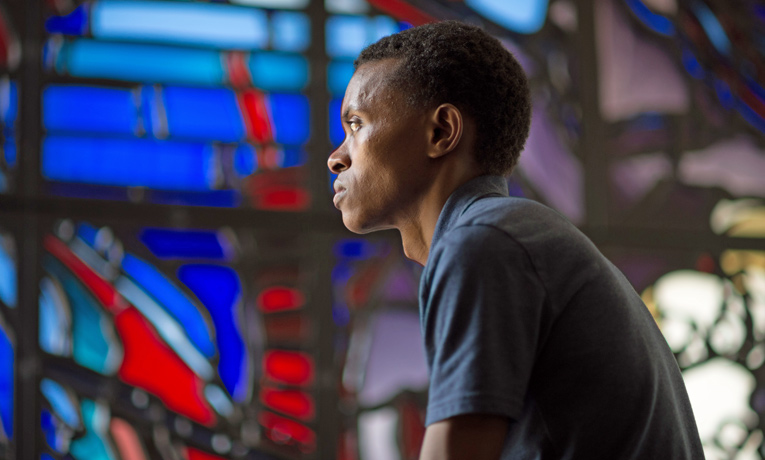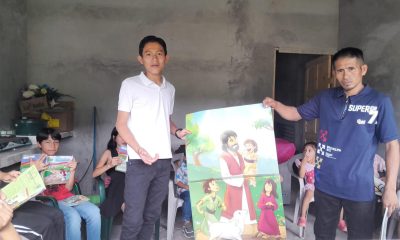A survivor of the Rwandan genocide returns home to show forgiveness to the people who killed his family
Alex Nsengimana paused inside a room of the Children’s Memorial section at Kigali Genocide Memorial Centre. Sunlight streamed through a door that opened onto a terrace overlooking a rose garden planted in remembrance of nearly one million people who were killed in Rwanda’s countrywide wave of ethnic cleansing during the spring of 1994. Photos of murdered children hung from clothespins and rustled softly in the wind, a gentle breeze that those young faces no longer feel.
“I look into their eyes and read what they wanted to be when they grew up,” Alex said through his tears. “This is why. I could have been one of them. And if I live my life with bitterness and unforgiveness, I’m not giving them justice. I’m just wasting my life.”
 Alex has journeyed through a series of providential events in his 24 years, including receiving a shoebox gift through Operation Christmas Child, that brought him to a strong faith in God and gave him the desire to return to Rwanda to plant a church and minister to the people who killed his family 19 years ago. He left his home in 2003 to study in the U.S. and graduated in May from Crossroads College in Rochester, Minn., with a degree in Pastoral Leadership. He plans to move back to Rwanda in the upcoming years.
Alex has journeyed through a series of providential events in his 24 years, including receiving a shoebox gift through Operation Christmas Child, that brought him to a strong faith in God and gave him the desire to return to Rwanda to plant a church and minister to the people who killed his family 19 years ago. He left his home in 2003 to study in the U.S. and graduated in May from Crossroads College in Rochester, Minn., with a degree in Pastoral Leadership. He plans to move back to Rwanda in the upcoming years.
In March, he embarked on the first step of his journey home when he visited the village where he grew up. He went to distribute shoebox gifts to children and offer forgiveness, in person, to his uncle’s murderer—a man who was his neighbor and friend.
 His time spent at the genocide memorial in the children’s exhibit, titled “Tomorrow Lost,” was especially poignant. Shiny plaques underneath photos summed up a handful of facts about each of the children: their favorite toys, food and drink, person, and things they loved to do. The bottom line of each plaque shakes and unsettles the reader. They list “cause of death” with each method more horrible than the last: “Bullet to the head. Grenade thrown in the shower. Clubbed to death. Hacked by a machete.”
His time spent at the genocide memorial in the children’s exhibit, titled “Tomorrow Lost,” was especially poignant. Shiny plaques underneath photos summed up a handful of facts about each of the children: their favorite toys, food and drink, person, and things they loved to do. The bottom line of each plaque shakes and unsettles the reader. They list “cause of death” with each method more horrible than the last: “Bullet to the head. Grenade thrown in the shower. Clubbed to death. Hacked by a machete.”
“They are my fellow brothers and sisters that never got the chance to go on to fulfill those dreams,” Alex said. “And I feel like I would like to fulfill their dreams, live their dreams, so that they didn’t die in vain.”
Alex wondered why he was spared when hundreds of thousands more were not. He has come to believe that by God’s grace, his story will help to bring healing to his native land.
 He was just 5 years old in the spring of 1994. But he will never forget that morning of April 6, when the plane carrying Rwanda’s president, Juvenal Habyarimana, was shot down. The president’s death sparked a massive wave of killings that continued countrywide for three long months and claimed the lives of Alex’s grandmother and uncle.
He was just 5 years old in the spring of 1994. But he will never forget that morning of April 6, when the plane carrying Rwanda’s president, Juvenal Habyarimana, was shot down. The president’s death sparked a massive wave of killings that continued countrywide for three long months and claimed the lives of Alex’s grandmother and uncle.
As he reflected on his experiences in the 19 years since that day, he returned—as always—to the theme of forgiveness that has come to permeate his very being. He realized years ago that in order to truly be free, he had to forgive the men who killed his family.
 “I want to be back in Rwanda so I can share the ministry of forgiveness because that’s the only thing that has continued to heal me,” Alex said. “Christ loves them just as much as He loves me. He doesn’t love me any more, and He doesn’t love them any less.”
“I want to be back in Rwanda so I can share the ministry of forgiveness because that’s the only thing that has continued to heal me,” Alex said. “Christ loves them just as much as He loves me. He doesn’t love me any more, and He doesn’t love them any less.”
Forgiveness is not about forgetting the wrong that was done against you, he explained, but about remembering—and in that remembering, finding healing and peace by looking back and seeing what God has done through your experience.
“You will have to go back to those unpleasant memories, but in the end you will have peace that only Christ can provide.”







